Less than fully charged …

Reading is the one thing I do with any regularity. Whether it is my measured 25 minutes each morning, incessant listening as I piece together a puzzle, or the occasional all day binge on the weekend, there is a book in my hand at some point every day. Consequently, when I determined to revitalize and re-shape this space, I knew I wanted to create a review feature. Not posting here regularly last year as I read through a mountain of books has one benefit, I always have a pile of material to choose from.
I knew I wanted to write a book review this week. I even knew which book I wanted to review this week, because it remains as vital and useful at this moment as it was when I read it last year. As often happens, however, the universe conspired to bring together disparate elements, putting them in relation until the underlying message and theme becomes undeniable. Now, instead of a fairly straightforward book review, there’s television, and social commentary. The only question remaining is where to start pulling this thread.
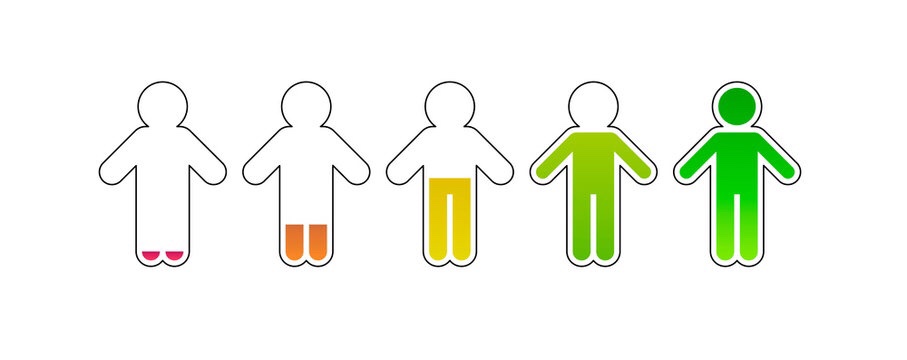
Energy is a great place to start. Last week, for reasons I couldn’t really explain, I ended nearly every day feeling like the figure on the far left. I was exhausted. In fact, on Monday night, I was in bed by 8:30pm and asleep before 9:00pm. The depletion of energy I felt by the end of the day felt inexplicable, because I was generally eating well, sleeping well, and would wake up feeling in the green. If I wasn’t completely charged like the image on the far right, I was pretty close. And, while I had work to do each day, there was nothing overtly stressful happening. I completed my daily task lists, without anything looming incomplete over me. Even the weather cooperated by providing a lovely bit of sun and warm weather to re-charge the world after our grim week of snow and ice. My exhaustion at the end of each day felt bewildering.
My week-night pandemic ritual has become nearly as well defined as my morning contemplations (dinner on the couch with 30 minutes of local news followed by The News Hour). Yet, this week I couldn’t do it. I couldn’t take in the news any more. Yet, I didn’t have the energy to do anything but sit in front of the television. Fortunately, Dr. Revolution chimed in at just the right time to convince me to finally start Bridgerton.
I’m late enough to this game that I don’t feel like I need to recap the standard fare about this show. If you haven’t heard about the intimacy coordinators required to make this show, or seen Regé-Jean Page on Saturday Night Live, the details are covered incessantly elsewhere. While I will admit the eye candy is lovely and the underlying romance swoon-worthy, this technicolor ode to Austen and Regency scandal sheets makes its way onto the blog for other reasons this week. I will elucidate below. For now, what I will say is that if you need a retreat from the world there are worse places to go than 1813 London.
Bridgerton follows the coming out season for Daphne Bridgerton, the eldest daughter of a Viscount. In this season a pseudonymous author Mrs. Whistledown begins publishing a gossip sheet detailing the events of the season. Daphne’s father has passed away, leaving his eldest son Anthony in charge of the family estate and Daphne’s courtship. As in often the case in such stories, Anthony is chaffing under the strain of his new responsibilities. Don’t worry, there are no spoilers here and I will not begiving you the entire plot run down. You only need the set up to understand that as Anthony attempts to exert his new authority as Viscount by making a match for Daphne he fails to consult her, and routinely dismisses her desires. Daphne often asks him something to the effect of, “Is it because I am a woman that you do not think me capable of knowing my own mind or understanding my own experience?” The question of a woman’s ability to determine her own desires, her own life, and to shape the world around her runs throughout the show underscoring many different plotlines. As does the way the men of the show continually fail to see women as fully developed people, not just as their role in society or function as an accessory to a man’s life.
Perhaps it is because I’d immersed myself in Bridgerton, that I started paying attention to just how many women are still forced to ask the same questions. Let me provide just one category of example, women’s health. Just this week, yet another friend shared with me the story of how complicated her relationship with her body and her health are, because she has consistently had to convince medical doctors to take her concerns seriously, to believe her description of her experiences, to treat her symptoms not her weight. She described how it has taken her so long to feel an ownership over her body and her health, after doctors – instead of treating her – asked her if she was faking her symptoms. I don’t know a woman without a similar story. If it isn’t an overt questioning of symptoms, “Are you faking it?” Ask a woman how many times the intensity of her pain has been questioned? How many times has she been treated like addict for asking for relief from that pain. My point is that women still, in so many ways, have to constantly prove the validity of their own experience.
The book, books really, I recommend today start from this point and explore the causes and costs of how women must navigate the world. Emily and Amelia Nagoski’s book Burnout: the secret to unlocking the stress cycle focuses entirely on women by identifying the elements that make life stressful for contemporary women and then providing a way for women to better manage that those stressors. The functional tips the Nagoski’s provide for dealing with stress are useful to everyone. Their discussion of the societal pressures creating stress creates a place where women can see themselves and their experiences taken seriously. The book becomes an expansive breath that reminds us that we are not alone.
To help frame their discussion of the societal pressures that create different stressors for women, the Nagoski’s rely on Dr. Kate Manne’s book Down Girl: the Logic of Misogyny. They identify Dr. Manne’s concept of Human Giver Syndrome as a significant stressor in women’s lives. If I did not overtly recommend Dr. Manne’s book a couple of years ago when I first read it, let me do so now. Dr. Manne is a philospher. Consequently the opening chapter or two of the book, where she situates herself within the philosophical tradition are dense. However, the following chapters where she lays out Human Giver Syndrome and her discussion of misogyny are brilliant.
Within this pandemic, we are all being asked to give more than what we are able to currently receive. And, we are all being asked to do this differently depending on our race, gender, our socioeconomic status, and all the intersections of those elements in our lives. Burnout and Down Girl describe what it means to be a woman in this world. Yes, they were written pre-pandemic, but their lessons are still relevant. Down Girl helps us to name, see, and understand women’s experience in the world. Burnout provides us actionable practices to recuperate from our experiences in the world. Of all the books I read last year and could have chosen to review right now, I chose Burnout, because it is so helpful. If you don’t want to read the whole book, Brené Brown interviews Emily and Amelia Nagoski in the first season of her Unlocking Us podcast. It is a remarkable conversation that brought me to tears at least twice.
After this week, I understand why my energy is depleted so quickly, and in writing this review, I am reminded that I know what to do to replenish myself.
Coffee and Contemplation

It’s been a cold and icy weekend here. Fortunately, both days I’ve convinced Moshe to wait until the temperature got above 30 degrees before we went for a walk. I love those mornings, because they are so quiet and allow me indulge in my favorite ritual. Drinking a cup of coffee in bed, in the dark, while I read on my Kindle Paperwhite.
I have no idea what other Kindles are like. For me, the Paperwhite is perfect for reading in the dark.
You’d think that, with all this contemplating, I would have something significant to say. You’d be wrong about that. Fortunately, I had material things to distract me this week! Last week, I finally ordered my last big rug purchase for the house.
I went into this rug selection thinking that I’d get a repeat of my multi-colored rag rug from my Aberdeen, NC kitchen. Then I started looking and I realized a jute rug would look amazing on top of my hardwood floors. I think it is also a nice accent to the plant corner in the bay window.
The point here is that for the last year a lot of what I’ve been contemplating is how to make this house a home that reflects who I am now. There are still things I need to do before everything will be the way I envision it, but the biggest elements for the public parts of my home are put together.
Skirting around the edges of all this contemplation is the question of settling in. I am doing my absolute best to believe, and act as if, I have found my home. As if this job, this house, this area represent the place I am going to be for a very long time. It seems so easy for some people to do this. To build gardens, to landscape their yard, paint walls, hang art with the trust that they won’t have to pick up and move in a few months. What I have realized is that none of that is easy for me.
Given how nomadic my life has been since 2015, I guess it makes sense for me to find it difficult to settle in to this place. The morning contemplations are helping, but I don’t have an answer for how to fix it, how to settle in and be in this moment. Yes, I know time is really the only thing that will allow me to settle. I’ll do my best to enjoy my home as time works its magic.
Miscellany

All week I’ve been keeping my eyes open and listening extra hard, trying to figure out what I would write about. While your skepticism is completely warranted, I wasn’t kidding last week when I said “I intend to be more regular about posts this year.” We’ve certainly all been around this block enough times to know that I am not going to make any promises about what “regular” means, and you probably shouldn’t set up any expectations about it either. Last week’s post had been brewing for a while, as had a series of book reviews that you are likely to see here over the course of the next few months; yet, as I planned to dust off this little corner of my world, I knew I didn’t want this to be all reviews all the time. All of this is a long winded way of asking your patience with a post full of random thoughts struggling to find its purpose.
Monday started pretty awesomely, when Moshe and I came across this friend during our evening walk. Just the night before, in my journal I’d predicted that this cold snap meant I wouldn’t see any herons for a few more weeks. Although I didn’t write it down, I was a little bummed, because it had been so long since I’d seen them. Finding this guy at our pond the very next day filled me with awe, especially when he stayed still as we walked along the pond in his direction.
I really hope my heron sightings are as common this year as they were last year. Last year, I often saw them flying across my path as I drove into work in the morning, or at home as Moshe and I did our morning walk. This year, working from home, I wonder how often I will get to see them. As the weather gets nicer and I want to get out of the neighborhood more often, I do know where I can go walking to improve my chances of seeing them often. This week, I’ve been reflecting on all the changes from the last year, but I have not been able to coalesce my experiences into anything yet. I’ve been trying to hard to anticipate the consequences and which changes I think will have a lasting effect. I need to sit with things for a while, before I try to name them.
Speaking of naming things, I’ve been thinking about identity again. Thinking about how our activities help define our identities and the labels we feel we can and cannot accept about ourselves. For example, one new identity I need to name and claim for myself this year is “pilgrim.” A good friend said she was going to do the Camino de Santiago this year. Although she longs to do it for real, walking the route from Portugal to Santiago de Compostela in northwest Spain, this year the Camino is virtual. For $60 you can purchase an app that logs your progress, provide pictures of what you would see on that day’s hike, and if you want can provide you with a community to check-in with on the journey. If enough people want to do it with you, you can even form your own team / community along the way. The proceeds from the app go to support the hostels along the route that have been struggling during Covid.
And, folks, you’ve now reached the limits of what I know I am doing, beyond walking about 480-some miles from Saint-Jean-Pied-de-Port in the French Pyrenees to Santiago de Compostela. My app tells me that while walking Moshe, and convincing myself to do a few extra miles on the treadmill, I’ve made 11% of my journey. I’ve not exactly been reverent about what I am doing, particularly since the friend who started all this nonsense has yet to start her own journey. So, I better take some time to figure out what being a pilgrim means to me before my estimated arrival in July.
My ever present identity crisis as a writer is also at play again this year. Because I don’t have a draft of my personal book yet, or any professional writing at any stage of the process, and I hadn’t written here in so long, I’ve been feeling like I shouldn’t call myself a writer any more. Hence, the intention to post here more regularly. Friday during my lunch break, as I sat catching up on my journaling, I happen to notice how much of this journal, started on 12/31/20, I’d worked through.
As I looked at just how far I’d written into this journal, I realized I was actually not as far as I normally would be. The year, my mood, and the way my morning habits have deteriorated have all meant that I’ve actually been journaling less than normal. I also started to think about my criteria for what counts as “writing.” I’m incredibly frustrated by my lack of progress on my personal book. Some of my struggle comes from the subject matter, and some of it comes from the way I’m trying to mix genre, and none of that is as problematic as my own imposter syndrome constantly telling me that I can’t write a book.
But, here’s the thing:
I have a book shelf full that proves otherwise. These are the 17 journals of various size that I’ve filled since January 2016, when I got serious about journaling. They each contain a minimum of 200 pages, many actually have more, and I have filled them all. Sure, the process and needs of writing the book I’m working on are different than those of journaling, but if I can fill these 17 journals, I can absolutely write the 40,000 words I need to create my book.
So, the other thing I did this week was make some changes to the house. I put together the plant stands I bought, so I could move the plant clan off my small desk. Moved my desk up stairs to the office, and created two different “working” spaces for myself. One side of the office is my “work from home” space, and on the other is my “writing” space. Hopefully, I’ve created a space that will allow me to channel the determination of my herons to make progress and finish the first draft of this personal project.
Don’t call it a book club!
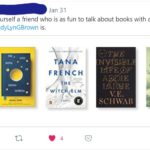
Last year, for the first time ever, I kept a list of all the books I read. As I made the list I decided ‘read’ included listened to, but I only included new books I listened to, not those I re-listened to as I waited for my Audible credits. The number of “new” books I read and listened too was 62, if I remember correctly. No one needs to know what that number would have been if I counted the re-listens.
Yes, yes, I know there are other options than Audible, and they are likely cheaper. But, listen, Audible is a known quantity for me. I know what day I get my credits. I know which narrators I love, which narrators I can tolerate, and which narrators to avoid. And, they recently started giving members access to a lot of free content each month. Sure, sometimes what I find there is trash, but sometimes it is exactly the trash I need. Am I happy that Amazon bought out Audible a few years ago? No. But, I assuage my guilt about giving Jeff Bezos money in other ways.
In addition to reading A LOT last year — which really didn’t feel like reading that much, last year was the year of crazy birthday presents that did not come on my birthday. Yes, there are multiple stories to tell about this; no, I cannot say when you will get them all. If y’all know anything about this space, it’s that I write about what I want when I feel like it. (Though, I intend to be more regular about posts this year.)
I believe was toward the end of September when my friend, Northwoods Renaissance Woman, sent me a message asking what I would ask, if I could ask Tana French anything. NRW earns her moniker because she takes amazing photographs, has her own radio show, and is in all ways cooler than any of us. For her radio show, she frequently interviews authors with new books coming out, and in the last year has snagged some impressive interviews. Of course, the Tana French interview was the most impressive for me. I gave her my question, and then waited rather impatiently for the interview and French’s new book to come out. Once the interview was complete, NRW sent me a five minute clip of French answering my question! I listened immediately, at work so I couldn’t actually squeal like a teenage girl, but that was exactly my reaction, especially when French answered the question exactly as I would have!
As soon as her new book The Searcher came out, I used the audible credit I’d saved for this moment, and downloaded the book. I binge listened to it over that weekend as I worked on a jigsaw puzzle. NRW had told me she was really interested in hearing what I thought of the book, so when I was done I texted her and we set up a quick video chat to talk about the book.
A few weeks later NRW tweeted about a VE Schwab book I didn’t realized had already come out. I mentioned how excited I was to read it, and NWR told me to let her know when I finished it. Once again, when I’d finished we set up an impromptu video chat to talk about our reactions to the story. We also talked about how much we enjoyed getting together to talk about books we read in common.
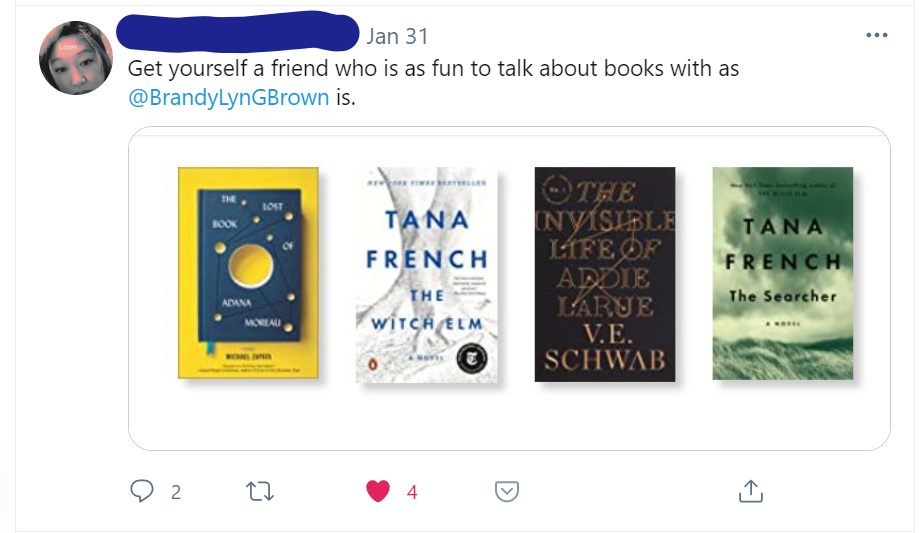
One of the things we both said we loved about it is that we do not have a book club. There is no deadline, no standard meeting, no agenda for the type of book we are reading, no special questions. We pick a book to read and once we’re both done, set up a chat. It’s been great, and we’ve picked some solid books, as you can see in NRW’s recent tweet, after our discussion of The Lost Book of Adana Moreau.
The Lost Book of Adana Moreau is an amazing book, particularly the first two-thirds. I was only a 1/4 of the way through when I texted NRW to say that this book made me feel like I was back in grad school. I know, I know that doesn’t always signify a good thing, but in this case it does. The book is such an interesting exploration of our identities and connections to one another. Even when it feels like the author takes a few too many side roads, you can see why the author is doing it. As I read I knew exactly which class and which professor I thought should teach this book. I even thought about emailing him to recommend it.
NRW and I are continuing our ‘not-a-book-club’ read along, and no you can’t join, because there is nothing to join. We are just two women, who get together to talk about books. Periodically, I’ll tell you when we find a gem like The Lost Book of Adana Moreau, or the other one we truly enjoyed The Invisible Life of Addie LaRue.
The number of the day …

233 – the day of the year. (It’s a leap year, so there are 133 days left.)
158 – the number of days since I started teleworking and social distancing from people. (I visited three friends in Raleigh in July, and have been on a socially distanced walk with a friend.)
23 – the number of says I walked one extra mile on my “new to me” treadmill in June.

25 – the number of days in a row I have done yoga.
13 – the number of days until I turn 47.
1308 – the number of days the current president, a known sexual predator, has been in office.
Counting days. It is what I do now. Counting days, counting blessings, counting time, counting infections, counting deaths (174,178) until the numbers no longer register.
The counting started with my social distancing (SD#) that I keep in my journal. It was a way to build in reflection, to monitor change. I read enough fiction and non-fiction to have known from the beginning that this would be on-going, and that it would lead to change. I wanted a way to reflect about the way the social changes, changed me. Yeah, I know. It all sounds pretty bleak. It is and it isn’t. I am very well aware of the good in my life. One change, however, is that I do not use the good to hide from the difficult, challenging, and sometimes bleak, truth. As challenging as it is, I would also argue it is a good change.
How else has this time changed me? I don’t have that answer yet. I am here in the middle of it, counting days and trying to hold space. Trying to breathe in the tension between the blessings and joy in my life and the reality of the world around me.
Today I learned that 1448 days ago on September 2nd, 2016, as I celebrated my birthday, and unknown to me Judge Paul Benshoof used his signature to grant me a divorce, Chanel Miller had to watch Brock Turner be released from jail. I’ve been listening to Know My Name. It’s taken me a while, because I can only listen to so much at once. It’s taken me a while, because it is so powerful, moving, heartbreaking, and beautiful. It is out in paperback this week, and I encourage you to get it. I’m sad to know such a thing happened on my birthday; but, frankly, 2016 was my personal 2020, so I am also not surprised. I am angry as I listen that more has not changed. This year, on my birthday, I want only good to happen for Chanel Miller and all the survivors of sexual assault and sexual aggression in the world. We deserve it.
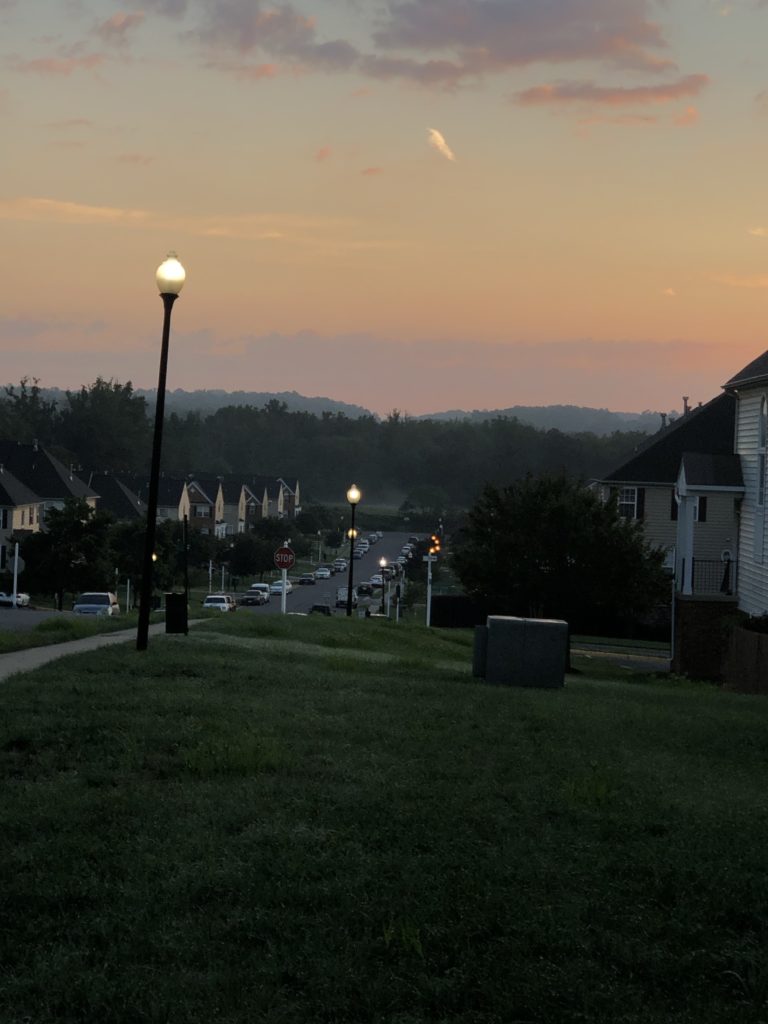
Unexpected Joy
![They Can't Kill Us Until They Kill Us by [Abdurraqib, Hanif] Book cover. Blue background, picture of wolf head and chest on a man's body wearing a red track suit with white strips down the shoulders and arms, and a thick gold chain around its neck.](http://grabow.co/wp-content/uploads/2020/02/TCKUUTKU-150x150.jpg)
Sometime last fall, in the space between knowing my life would change and that change beginning, I started to read Hanif Abdurraqib’s They Can’t Kill Us Until They Kill Us. Ouiser’s recommendations never steer me wrong. You can trust them as well. I savored this collection of essays. Reading for a few days in a row before turning to another book as the mood struck me, but always returning to dip back into the space and sound of the writing. Abdurraqib writes about a wide variety of music, by weaving his story into the experience of listing or attending a concert. He uses those stories to reveal the contemporary moment in a way that made me pay closer attention to the music filling my world. Everyone should buy the book, even if you only read “A Night in Bruce Springsteen’s America.”
![They Can't Kill Us Until They Kill Us by [Abdurraqib, Hanif] Book cover. Blue background, picture of wolf head and chest on a man's body wearing a red track suit with white strips down the shoulders and arms, and a thick gold chain around its neck.](https://images-na.ssl-images-amazon.com/images/I/51D8sJcFPRL.jpg)
There are so many tools that are made for my hands.
But the tide smashes all my best laid plans to sand.
Neko Case – Night Still Comes
In the final pages of the book, Abdurraqib elegizes 2016. A year that many of us individually, and as a nation, struggled to survive. To think about what happened in the country in 2016, I have to carefully untangle each event – each death, each killing, each mass shooting – from the death of my marriage. For me, 2016 is an endless coordination, getting my ex-husband to help, alerting his family, talking with doctors, finding someone to care for the animals as I constantly drove from Bemidji to Fargo and back each Saturday from January – March, bringing him home, returning him to another hospital, and starting the cycle over. Navigating 2016 took every tool at my disposal, and, at every turn, each plan I made smashed against the reality that my marriage was over.
Abdurraqib’s elegy for 2016 takes a different approach. Describing his response to the horrific Pulse nightclub shootings in Orlando, Abdurraqib recounts how the sounds of children riding their bikes reminds him that it is in the small moments of joy that we regain our strength to return to the fight.
And, as I think about 2016, I remember the phone calls. Long talks with friends and family full of tears and laughter. I remember the unexpected care packages. I remember the happy hours spent eating fried foods and deepening new friendships. I remember learning to accept the help offered. And, I realize how each of these moments renewed my strength. The cleansing tears shed with friends. The laughter at a macabe joke, because … what else can you do? The warmth brought by a smile and an invitation to lunch. The joy – large and small – made it possible for me to make it through the night I feared for my safety, for me to pick up the pieces as each plan failed, for me to know without a doubt when it was time to let go.
I do it for the joy it brings
Ani DiFranco ~ Joyful Girl
‘Cause I’m a joyful girl
‘Cause the world owes me nothing
And we owe each other the world
Abdurraqib concludes, “Joy, in this way, can be a weapon–that which carries us forward when we have been beaten back for days, or moths, or years.” And I remember how beaten down I felt in the years leading up to 2016. How alone I felt trudging from one crisis to the next just trying desperately to hold it together, to make sure I could provide for my family. Yes, there were moments of joy in those years, friendships made, but I remember how my smile rarely reached my eyes, and my guard never fully came down. In 2016, joy became my weapon. It carried me forward each time an event beat me down. Joy also became the weapon of my recovery. It flooded my life in the fall of 2016: the house full of friends at the birthday party I threw for myself, the renewal of old friendships, the long mornings and afternoons on the deck, the comfort of the dogs and cat as we settled into our new normal. The joy in those moments, big and small, salving my wounds, healing me, and carrying me forward.
My cup …
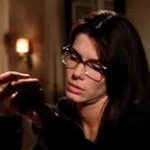
My status as a fan of Sandra Bullock movies shouldn’t surpise anyone at this point. For me, and I am pretty sure for many Gen X women, Bullock embodies the “woman facing hardship gets her happy ending” trope. Yes. She has done more, and better, but there is a magic, charm, and relatability to Bullock that make Practical Magic, Hope Floats, 28 Days, Divine Secrets of the Ya Ya Sisterhood, and even Miss Congeniality go to comfort movies for so many of us.
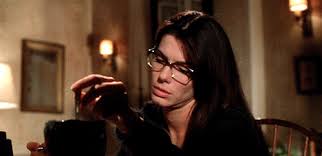
Sure, I may have watched my share of Hallmark movies, but when I really want to dream about love, I watch Practical Magic. Dreaming about Sally Owens conjuring a man she thought couldn’t exist and magic bringing him to her at just the point when she needed him, makes it feel possible that the the man I think doesn’t exist is out there and will show up at just the right time.
Practical Magic may be the movie I watch when I need something to make me believe in love again. Hope Floats is the movie I watch when I need to remind myself that the world will right itself, and that regardless of where I am from or what has happened to me, life will right itself. I will get through. Life is long; rise up, as my tattoo reminds me.
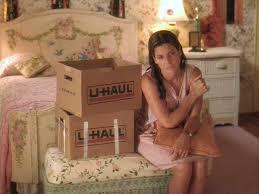
Birdie Calvert/Pruitt’s life spectacularly crashes, burns and she must return home to recover and rebuild herself. So much happens here it is a feel good movies for nearly every situation, as long as you like your inspiration to come while tears well in your eyes. For me, the hope in this movie, the message that floats above all the others isn’t about the patient and deep love waiting for Birdie when she is ready. The hope is in the way her relationship with her mother changes over time.
Ramona Calvert tries to teach her daughter is one of gratitude. At the beginning of the movie, worn down by her experiences, all Birdie can see is the way life has let her down. In contrast, Ramona embraces the joy in her life, and her most repeated line – and the lessson to Birdie – is that “Her cup runneth over,” meaning her life is full of blessings, even in hardship.
I have my moments, and I swear every time I face unpacking from a move, a part of me feels like Birdie Pruitt moving home. In the last six years, I’ve moved across the country, divorced, moved back, accepted a new job with a formidable learning curve, moved again, and find myself in a completely new region. In that time, I have also learned who I am, how to love myself, and how to accept what I deserve.
Each day, as I walk Moshe around the neighborhood, as I pass through the gates and drive into work watching the sunrise over the Potomac, my heart fills and all I can think about is how my cup runneth over. As much as I am grateful and love my life, I still long.
I don’t often talk about this, but I am still searching for a partner. Contemporary dating is a very unique and special kind of soul crushing endeavor. On one hand the options are seemingly endless (just keep swiping); yet, on the other, every swipe leaves you feeling more an more alone. For the last two years, the first item on in the Must Have portion of my Conditions list has been Love. Last year, amongst all the dating, I fell deeply in love with myself for the first time. I have no idea how this year will turn out yet. As Valentine’s Day approaches, I can tell you I do not feel very hopeful about romantic love. Yet … my cup still runneth over.
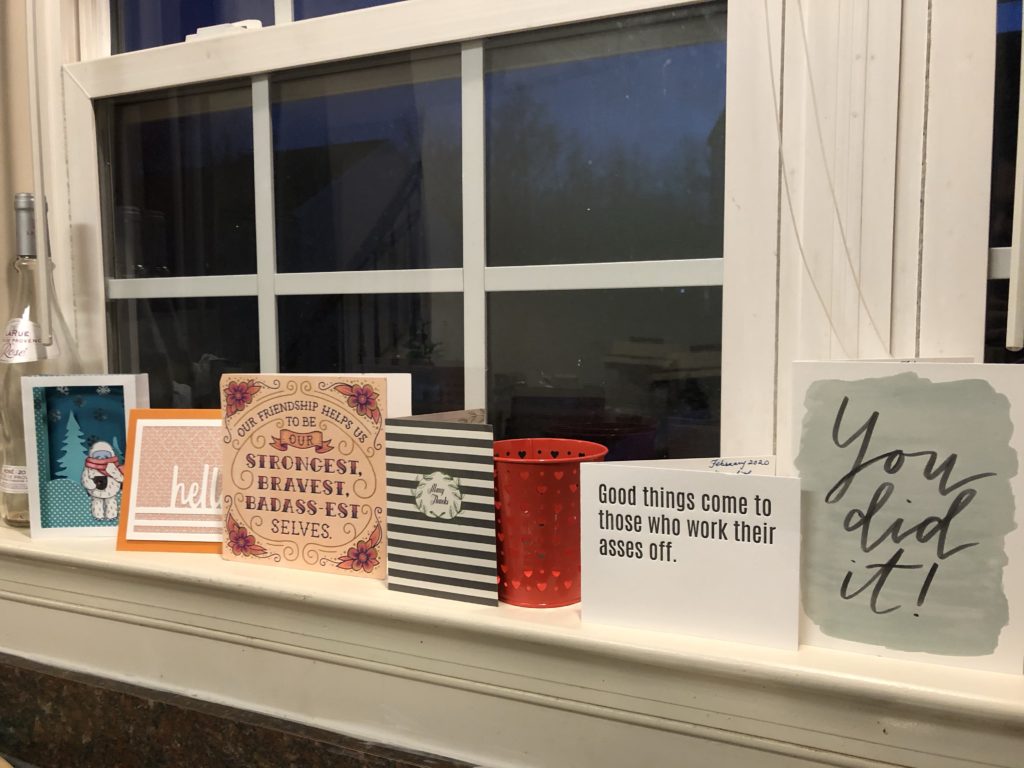
In all honesty, my life is full of love. Girlfriends from high school to those I made in moving here, have called, sent me cards, or gifts. Each gesture reminds me of just how much love I already have in my life. These women see me. They know my best, worst, and just how far I have come. They teach me how to celebrate myself; and, by showing me their love, they teach me what to expect from someone who claims to love me.
I may not have found my Aidan Quinn or Harry Connick Jr. just yet; until I do, I will hold on to the way my girlfriends make me feel. Because, for each card here, there are at least 2 – 3 more who have show their love in other ways. I carry this with me always. My cup runneth over; and, my girlfriends set the bar for how to love me.
Long and winding …

Much like the summer of 2017, when my experience in the House of Plagues forced me to move twice within a month. The last six months of 2018 unexpectedly involved two moves.
In July, I left my beloved, neat, little bungalow with the red door and moved in with a colleague to be closer to work. A great idea at the time, it saved me some money and meant that I could walk to work.
Something else happened in July, though, something that would make this move short – lived and change the direction of … well, everything. On July 12th, I submitted an application for a job that sounded like someone had been listening to everything I said I wanted from my career. Had I not been moving a thousand miles an hour trying to work, pack, have a life, and put together this application, I might have thought a little harder about it all. I may even have talked myself out of applying, but I didn’t.
When, as I unpacked all my stuff into my room and closets in the new house, I learned I’d made it to the first round of interviews, I was amazed and so excited. I went to the website and downloaded one of the pictures from their carousel and made it the desktop background on my new laptop. The interview day came and went. A video interview from my office to theirs, it felt like it went well. A few of my answers felt unfocused, but I made them laugh a few times, so I hoped that would even things out.
As the weeks passed and I didn’t hear about the expected second round of interviews, I started to lose hope. Perhaps I wasn’t meant to work on that beautiful campus next to that river. It didn’t occur to me that I hadn’t heard about a second interview, because they’d decided to offer me the job based on the first interview! But, yes, dear readers, that is exactly what happened!
Okay. Seriously. From here on out, you cannot complain about the amount of exclamation points, because you cannot underestimate my level of shock, awe, and excitement. Yes, this job represents nearly everything I wanted in my career. It also represents a dramatic shift in location. It requires me to move to a major metropolitan area. Something I never thought I would do, but I am completely on board with and cannot wait to do! (Okay, the rent prices did give me pause, but life will definitely be worth it!)
In January, after setting “foundations” as my word for the year, a dear friend told me I needed to be “foundationally brave.” I took her advice to heart all year. “Foundationally Brave” post-it notes resided on my mirror, on the edge of my monitor at work. The reminder was always there as I considered what I wanted my life to be. Yet, in January, I could never have conceived of where this phrase would take me.
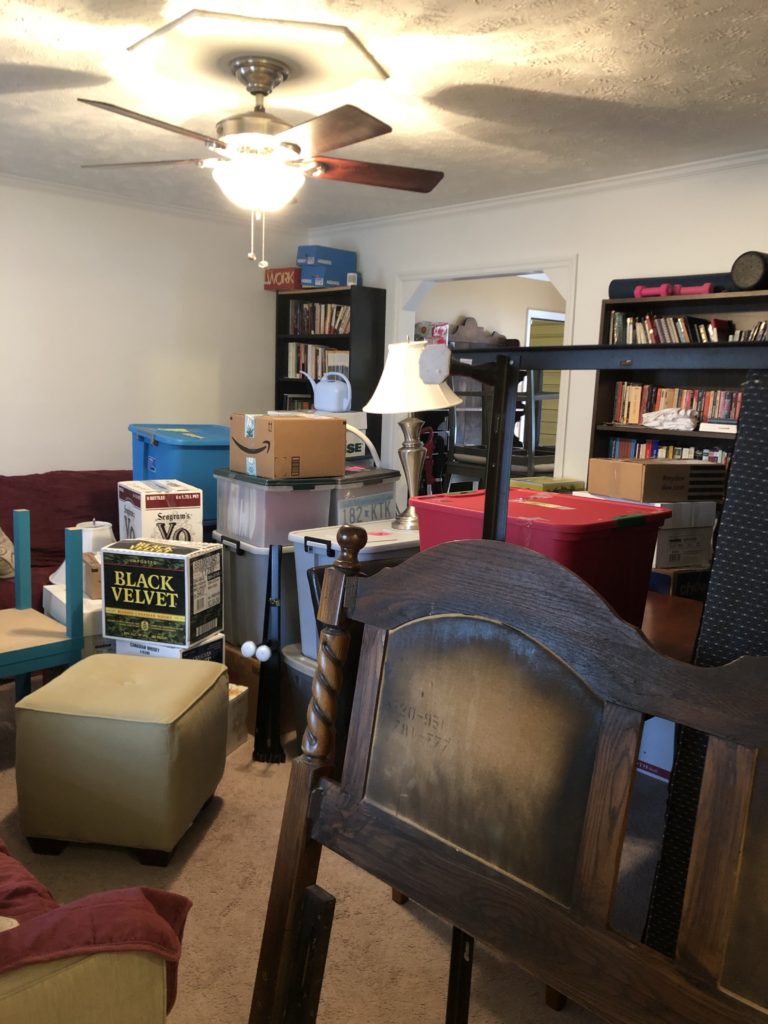
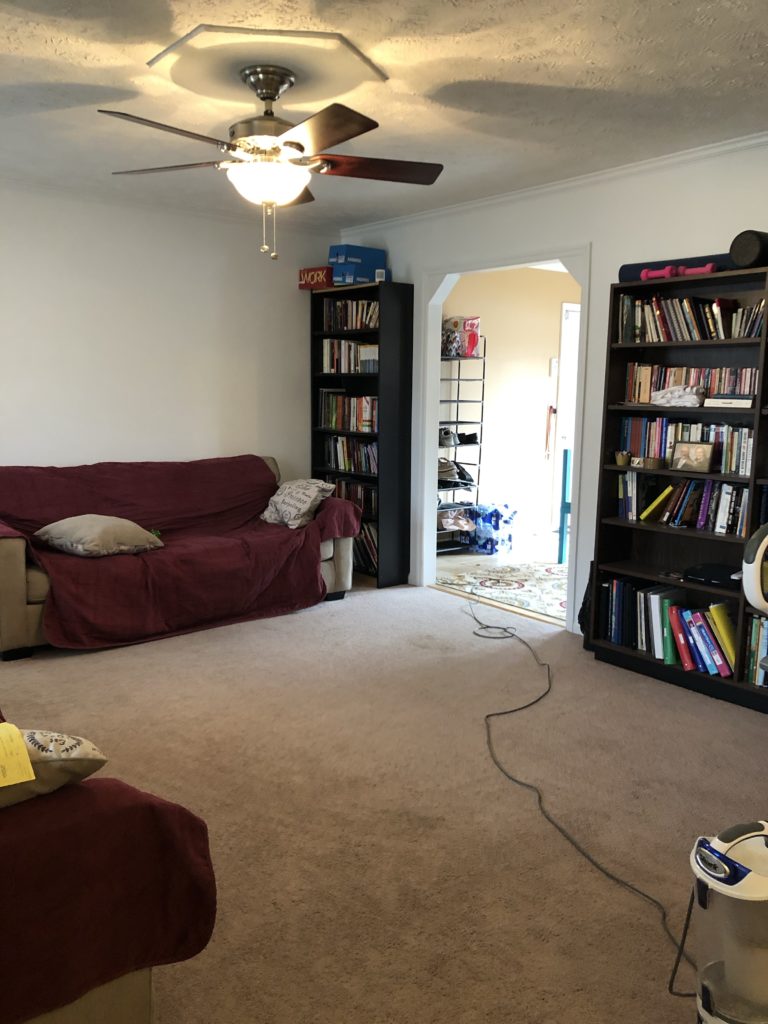
Once again, I downsized, shed about 1/4 of what I had left, or acquired, since the last move. I packed up all my stuff, and this time movers came to take it away. Tomorrow morning all the living things, and last little bits will head off on the five hour trip to our new home.
We will get to ring in the New Year, in our new space, and then wait for the rest of our stuff to get there. On Monday, January 6, 2020. My new life will really begin, when I report for my first day of work. In addition to adapting to this new environment and learning the ropes, I know there is at least one major project waiting for me; and, through all the changes, all the moving hassles, all the unknowns, the stress is mitigated by my excitement. I cannot wait to start this new life!
I’m not making any promises about how and when I will post around here, but I do intend to chronicle all these changes. Right now, I’ve kept things vague, just because I am not sure exactly how I want to talk about them yet. I will figure it out as I go, and I, honestly, cannot wait to take you all with me!
Reading Series: The Freelance Academic

Getting an advance readers copy (ARC) of a book invariably involves knowing someone and a promise to write a review of the book. You might know someone at the publisher, or have a friend who knows someone. At any rate you know someone who knows you have an interest in the genre or subject matter, and that you could provide a review. Yes, I am dorky enough that I love the way getting an ARC makes me feel like an insider. With this ARC, I have the additional privilege of knowing the author. Having met Katie Rose Guest Pryal in graduate school, not only have I had the privilege of calling her a friend, I have known her during many of the events in this book.
For the first time, knowing the author whose ARC I’m reading, considering her a friend, made writing this review difficult. I finished The Freelance Academic, a couple of weeks ago. Sure, some of my delay posting stems from scheduling. Mostly, however, the delay comes from how much I want you all to read this book. As I struggled to develop my thoughts about why I want everyone to read this book and what I could say without giving too much away, I decided the best way to get started was with transparency. Yes, my friend wrote this book and I am about to write a very positive review about it; however, what I need for you to fully understand is that those two things are not dependent upon one another.
In Brittney Cooper’s book Eloquent Rage, she describes a home-girl intervention, as an instance when a friend firmly, but lovingly calls us on some bullshit and educates us in a way that makes us better. Cooper tells the story of a friend from her undergraduate days, who called her on her dismissal of feminism and got her to engage with bell hooks. Cooper’s engagement with hooks and feminism is clearly a defining moment for her. Cooper’s friend’s willingness to stand up to and educate her came at just the right time to shape Cooper’s thinking and career. The home-girl intervention isn’t always what we want to hear, but it is what we need to hear. It requires a friend brave enough to be blunt with us.
In The Freelance Academic, Guest Pryal steps up to do the same work for readers. There are many blog posts, websites, articles, and books out there about the state of the academic job market, reasons to leave academia, how to find work outside of academia, and a lot of what has been dubbed “quit lit” about how individual people have navigated this transition. Understandably, many of these narratives illustrate the problem with academia which has caused the person to leave, then describe the fulfilling and rewarding life leaving academia allowed the person to build. Skimming the messy, difficult time between leaving academia and getting to that fulfilling and rewarding life is understandable because those periods are often so personal, so influenced by the details of our lives that authors can be forgiven for not sharing what they may not realize could be helpful to others.
Drawing on personal experience and biography, The Freelance Academic fills in this gap. Using the details of her own story, Guest Pryal offers valuable insight and practical advice on how she has built a freelance career outside of the academy. The result is something special. By acknowledging the details of her story that enabled her to follow this path, Guest Pryal opens the door for readers to flexibly engage with her advice. For those in situations similar to her own, The Freelance Academic becomes great guide for building a freelance career. For those of us still working in academia or in different situations, The Freelance Academic still provides an amazing amount of value. It is, in the best sense, a home-girl intervention. Guest Pryal unflinchingly calls out and lays bare the conditions in which we work, and then she educates us, provides us with new way to think about the way we work and who and what we are working for. There isn’t much more I can say without spoilers. Whether you are currently in academia, considering leaving, or have just left, The Freelance Academic comes at just the right time to re-frame how you think about your work and the path you want to take.
Reading Series – Text Me
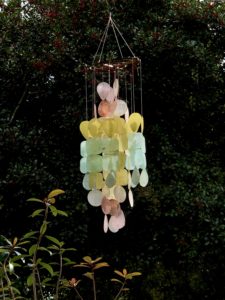
While I thought it would be the book I closed out 2018 with, Text Me When You Get Home: The Evolution and Triumph of Modern Female Friendships by Kayleen Schaefer ended up being the first book I finished of 2019. The book’s primary message that our romantic relationships do not make up the only love story of our lives isn’t one I mind carrying into 2019. Tending to my friendships is often an intention I set and re-set for myself.
When I first started reading it, I made a list of all the women I wanted to send copies to for Christmas. Ultimately, though I am glad I didn’t follow through with that plan. At the end of this book I started with such enthusiasm, I was underwhelmed. My enthusiasm for the book stemmed from the way it seemed written for me.
Circumstances being what they are, I am a straight, single, professional, white woman whose primary form of emotional support comes from her friends, which is exactly what Shaefer describes in this book. Ouiser is my emergency contact in all things. Dr. Lawyer was my person during my most recent medical adventure. I rely on Amié Volée for help with Les Animaux and her family always makes sure I have a place to go for the holidays. I could go on and on about how Dr. Revolution, Dr. Phoenix, The Banshee, and others have been just as integral in my life and form my collection of people. At the beginning of the book it felt great to read someone recognizing the importance of these friendships. I wanted to send everyone copies to show them a reflection of our relationships.
The recognition of the importance womens’ friendships can play in our lives was refreshing, but I wish Shaefer had spend more time examining the ramifications. In this extended passage she quotes and summarized Briallen Hopper, who says she is:
“not ashamed to admit that my friends are my world. They are responsible for most of my everyday joy, fun, and will to live.” [Hopper] goes on to explain that, despite, this, it can be terrifying to make friendship your main support system. The relationship is “chronically underrated and legally nonexistent.”
I wanted more of discussion about how the women who value and create these friendships work to change these ideas. To be fair Schaefer does provide examples of women listing friends as emergency contacts or beneficiaries on insurance policies. As I read though, I was longing for a more sociological discussion of the consequences of this behavior.
As I mentioned above, Schaefer’s book primarily describes and discusses the friendships of straight, single, professional, white women, which is part of what made me enjoy this book. It is nice to feel seen and represented. While Schaefer attempts to address women of color and other differences by describing positive media portrayals of these friendships, her discussion of them remains shallow. This is a comment an early Amazon reviewer made and I do think she attempted to address it in the final work. However, because it is her own story and friendships serve to illustrate many of her points, the work never feels as inclusive as it attempts to be.
Overall, I enjoyed this book. It provided me with an important mirror at just the right time in my life by reminding me that, while it may not look like a Hallmark movie or the relationship in a paranormal romance book, I do have an incredible love story in my life. My friendships are deep, abiding, and essential to my joy. In the end though, I also wanted a little more analysis and discussion.



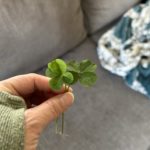


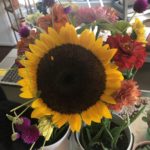

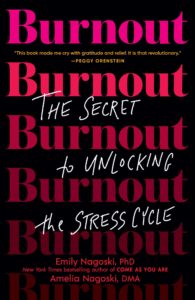
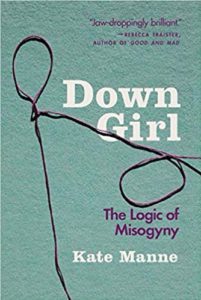


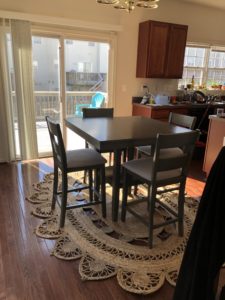


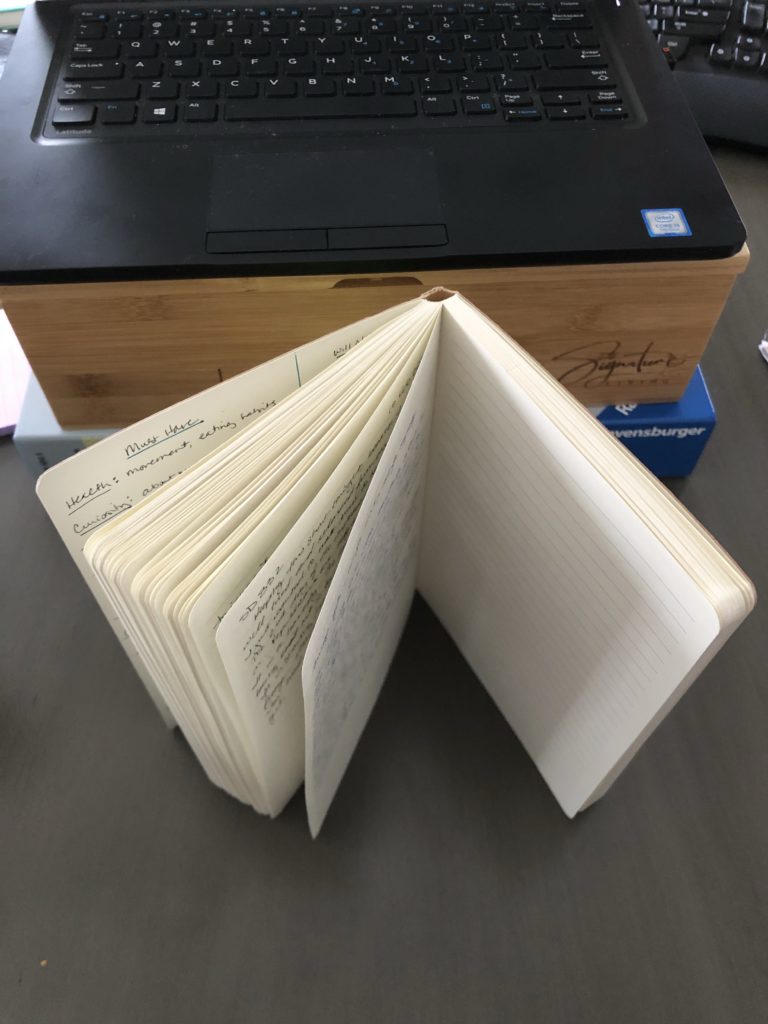
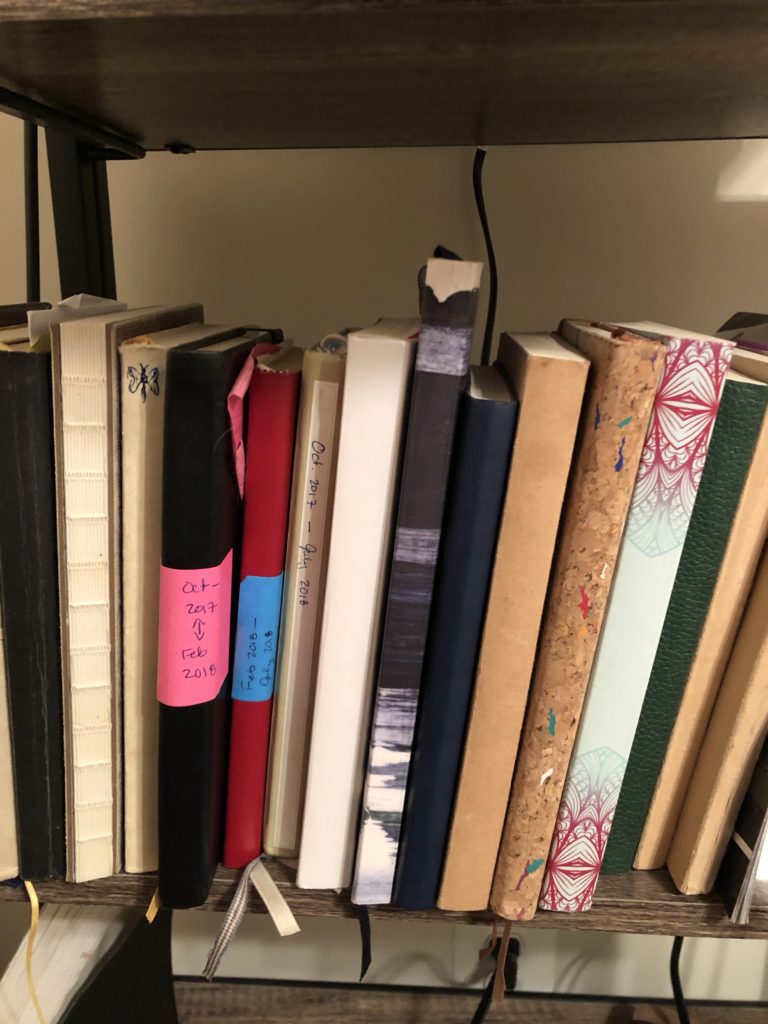
 D5 Creation
D5 Creation